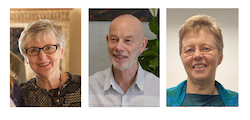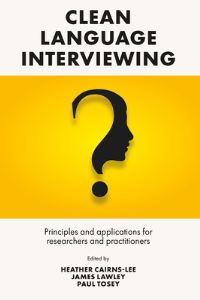I had an interesting dialogue with a student preparing for their first modelling project as part of a master NLP training. Below is a summary of that conversation in two parts.
Part 1
The trainee modeller had read Penny Tompkins and my internet publication How to do an NLP modelling project and emailed me a couple of questions about Stage 1 – How to Prepare. They asked:
My project outcome is: To stand my ground. I want to learn to risk giving my opinion and expressing my feelings in any situation without feeling ashamed, awkward or anxious.
Does this fit with what a modelling outcome should look like?
My second question, in Stage 1 what exactly do you mean by:
- Scope
- Time scale
- Presuppositions
Are you referring to the basic assumptions which could be used as resources or to the presuppositions I myself believe to be true in my model of the world (which then blocks me)?
I replied:
Based on my experience of having supported hundreds of people to learn to model I think your outcome meets one vital criterion for a first modelling project but does not meet several other key criteria.
Your project outcome is clearly important to you and I applaud you for selecting something significant for you. This makes a big difference because it will provide motivation to complete the project (especially when it might seem easier to be doing something else!)
However, I’d class your current wording as a therapeutic outcome, not a modelling outcome. Of course you want to achieve these things but I do not recommend going into a modelling project with this intention. Instead I suggest you identify the behaviour you would would like to acquire, i.e. identify exemplars you know (preferably from first-hand experience) who consistently do behaviours you would like to be able to do. Then you can find out the name each exemplar gives to this behaviour, and model that (setting aside any ideas you may have of how they achieve that internally).
Once you have gathered the relevant information, constructed your model and are able to reproduce the behaviours you will have completed the technical side of learning to model.
By then I suspect you will have found out if you are better able to “stand my ground“. Probably you will, but if not, or if not enough, you may need to adapt the model to your personal outcome – or do some more modelling. This, however, would be outside the scope of your original NLP modelling project.
In short, I am suggesting separating your modelling from your personal development. It may well be that the former influences the later beneficially but if you start out with that intention, the latter may adversely affect your ability to do the former!
I will answer your second question, what is meant by scope, timescale and presupposition by giving you a series of questions to ask yourself:
Scope
What are the limits of the skill you want to acquire?
When do you want it and when not?
Where and where not?
How much of it do you want?
What is too little and what is too much? (Every skill has a downside if done to excess.)
Will you select exemplars from one gender or from both genders?
Timescale
How long do you have to do the project?
How much time do you need for each of the five stages?
How many exemplars will be involved?
How long will you be able to observe them?
How long for the interviews?
How many interviews per exemplar?
Can you get through all the stages in the time available? (In your first modelling project bigger is definitely not necessarily better. Generally, going through all the stages of a small chunk topic in depth will teach you more about how to model.)
Presupposition
If you examine your original outcome you’ll see it contains a very clear metaphor and lots of presuppositions. Let me give you some examples:
You may want to “stand my ground” but that metaphor may mean little to an exemplar. Someone else may say they “have strong boundaries” or “put myself first” or “speak my truth” etc. etc. If you use your metaphor you may limit the people who could be exemplars or the kind of answers they give you. So describe the behavior you are interested in rather than the metaphor when you approach potential exemplars.
Your statement presupposes that people “risk” giving their opinion. It is highly likely that many people who are good at giving their opinion do not think of it as “risking”.
It may also be possible that people who are particularly adept at this skill can give their opinion or feelings even if they feel “ashamed, awkward or anxious”. Your outcome puts conditions on the behaviour which may not apply to your exemplars or exclude some exemplars who could be useful to you.
And your knowledge of the NLP Meta Model should alert you to an outcome that includes the words “any situation” (see Scope above).
Finally, I will give you some unrequested feedback. You ask,
“Are you referring to the basic assumptions which could be used as resources or to the presuppositions I myself believe to be true in my Model of the World (which then blocks me)?”
This is a low-quality modelling question because it leads me towards a pre-defined answer; and the either/or format constrains me to those two options. (Luckily I can stand my ground and not be confined by the question, but your exemplars may be more polite than I!) Your initial question “What do you mean by …? was enough. The supplementary was an unnecessary distract. The general rule with modelling questions is keep them short – less is more.
Part 2
The trainee modeller replied:
I am so grateful that you have taken the time to provide me with your thoughts and reflections! These are extremely helpful to me, many thanks! All your input has been helpful but I have especially learned a lot from the explanation you have given around the presuppositions. Based on your input, I have changed my modelling outcome to:
The behavior I would like to model so to be able to acquire and reproduce it is the ability to publicly express an opinion and/or feelings.
Am I on the right track?
I replied:
I’m glad you found my comments helpful. And yes you are on the right track since your latest outcome is definitely a modelling outcome. Congratulations.
And you now have the opportunity to continue and refine it (almost everything to do with modelling involves ‘iteration’ and what we are doing here is an example of iteration at the design stage).
Are there particular contexts where/when the particular skill you want is most evident? If so this can be built into the outcome to narrow it down. For example:
Are there situations when you would most like the ability, e.g. in a formal presentation; or during a public debate or a private discussion; or when you want to disagree with someone; or when your views are challenged; or in a negotiation, or when the effects of expressing feelings could have significant or longterm consequences; etc. etc?
Does the size of group where you want to publicly express your opinion matter?
Is it important to apply the skill when particular kinds of people are involved, e.g. work colleagues, family, peers, authority figures, partner, etc?
Questions like this can help you to refine your outcome so that it reads something like: “The ability to publicly express an opinion and/or feelings especially in [context/situations X]”.
Remember, your primary outcome is to learn to model. The particular project you have chosen is the vehicle by which you are doing the learning. I know you want the ability generally and my experience is that for your first project it is better to make the outcome well specified and narrow for a number of reasons:
- To help you to sort the salient from the irrelevant
- To keep you from getting overwhelmed by the amount of data you are likely to collect
- To enable you to go into more depth with your exemplars since that is where you will likely find extra richness and unexpected gems.
Once you have acquired and mastered the ability to publicly express an opinion in one context you will likely find it easier to transfer that ability to other contexts.
And something else for you to think about in your project design: Are you going to choose people who seem to be able to do it ‘naturally’ (i.e. have always been able publicly to express an opinion and/or feelings)? Or would it be more advantageous to choose exemplars that have learned how to do this (i.e. at one time they had difficulties doing this but not anymore)? Or maybe some of each?
Lastly, I will give you a tip. With this particular topic, a likely important area to investigate during Stage 2 of your project (Information Gathering) will be: How do the exemplars ‘handle’ the potential effects of expressing their opinion? There are always potential effects when one expresses one’s opinion/feelings and these often have a constraining effect (sometimes for the good and sometimes not). How do your exemplars know when/where/how to express their opinions and when not to? Do they have that choice, and if so how do they do that?
Also see my blog:
How to start a modelling project







